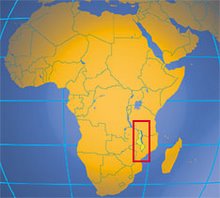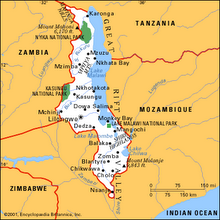One of the most emotional times over the holidays was a few hours spent with one of my Chichewa teachers in Machinga. Chrissy, a kindergarten teacher and Albert, a high school English teacher, were a perfect pick for my language lessons. Good teachers with lots of energy, this couple was always willing to spend a few hours pouring over my notebook and small language text as I tried to learn. Chrissy would prepare popcorn or roasted peanuts and we would munch away, laughing at my mistakes until my brain was fried. Afterwards we would sit and play cards or checkers, bouncing their son Domenic on our laps, usually talking about Canada as they were very curious about everything from the politics to sports, from the weather to employment.
More than my teachers, though, this couple became some of my very good friends. Over Christmas, Marc and I gave them a book on Canada, with pictures and descriptions of the country and its vast and varied environment and landscape. We spent one afternoon for a few hours sitting with Chrissy and talking about Canada. Laughing as she asked questions about the ice on the rivers or the changing colours of the trees. “I would never survive” she said as she gasped at the snowy landscape.
As we were leaving her house and I was saying good bye as I was leaving Machinga for a few months to spend some time working in the head office in Lilongwe and do some research in another district, she said some things that made me think. In thanking me, she got very quiet and serious. She not only thanked me for the gift but for my friendship. “When I see you in town and I’m with my friends, they ask me about you. She’s different, I tell them. She’s simple. She’s like us”. You are not like others, she said. You are simple and humble. When you first came and were living here in Machinga, we all worried how you would be, living in these conditions coming from a country that is so different and more advanced. But you have no problems. You eat what we eat. You treat us no differently. You treat us as equals, we have good talks and we are friends.
I was extremely moved by her words but also saddened. Why should she expect me to treat her or anyone else differently? Why should they worry about how I will live in “these conditions” when they do so everyday? Why should she be surprised by my actions and thank me? But the sad part is that in rural areas, the vast majority of Malawians are surprised when they are treated as equals by foreigners. They are surprised that we can survive without flush toilets and stoves, creature comforts and knives and forks. But there must be a reason why they are surprised. They must have not been treated with respect enough times in the past that when they are, it seems “different” or “surprising”. It makes me more eager and determined to break down these stereotypes at every opportunity. Everyone has prejudices. But we are all human beings and need to work to remove these prejudgements, good or bad, about others because of where they come from or the colour of their skin.
Sunday, January 13, 2008
Subscribe to:
Post Comments (Atom)



1 comment:
I was impressed with your list in the last post..but this is really powerful Heather.... it has broad reflections that I think the chapter will find touching and movtivating.... seems like the LP will be easier than I thought...
Post a Comment